NEFU was formally established in April, 2010, on the basis of the Yakut State University named after M.K. Ammosov, the university with 75 years history.
In 1907, in “Yakutskaya Gazeta” it was written that only one Yakut man took a higher education course. This fact shows the past of Alma mater better than anything.
The development of education and science in Yakutia was the dream of the best representatives of the Sakha people. The first man, who wrote that it was necessary to establish the institution in Yakutsk for teaching the local population, was the Head of the Borogonsky District Aleksey Arzhakov, also known as Sehen Arzhakov. On September 18, 1789, he personally presented to the Russian Empress Catherine II his “Plan about the Yakut people with indication of benefits and the best positions for them”. In Aleksey Arzhakov’ “Plan” it was also written that it was necessary to establish in Yakutsk “an educational institution for the Yakut people, who should be taught to use the Russian reading and writing and other sciences ... so they could be ready for the public service and to educate their relatives”.
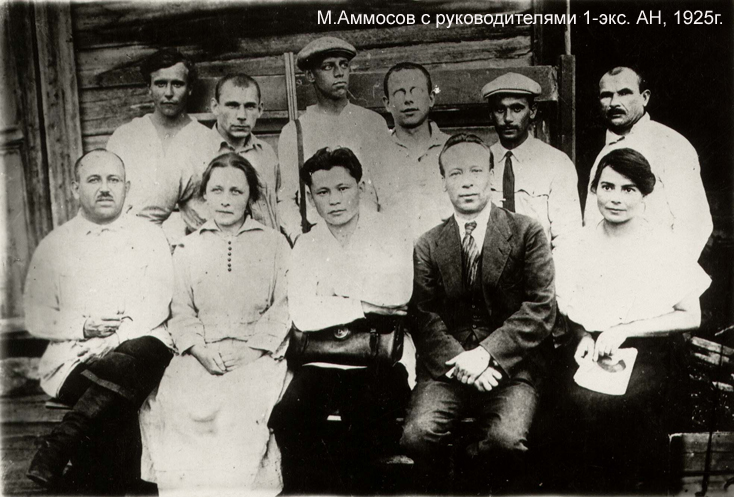
In the early 30s of the 20th century there were 496 schools, 14 technical schools (mining, road, construction, medical, consumer cooperative, fisheries, agricultural, financial, fur farming, marine, three Teacher Training Colleges) and pedagogical and agricultural workers' faculties in Yakutia.
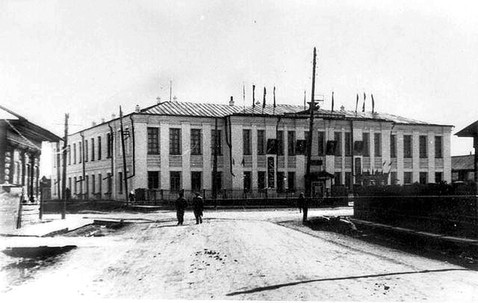
The history of the Yakut University began in 1934, when the Yakut State Teacher Training Institute opened its doors for school graduates in severe conditions of Yakutia. During 22 years, 2535 students graduated from the Institute and became teachers.
The history of higher education in Yakutia was begun by the first Director of the Institute I.P. Zhegusov, organizers of the educational and scientific process I.A. Melnikov, S.F. Popov, social science teachers P.M. Kornilov, I.K. Fedorov, V.A. Tsvetkov, mathematicians I.I. Sharapov and S.V. Rodionov, physicists Y.G. Schafer, A.S. Kovalevsky, M.A. Alekseev, philologists V. V. Yakovlev, N.S. Grigoriev, K.F. Pasyutin and others.
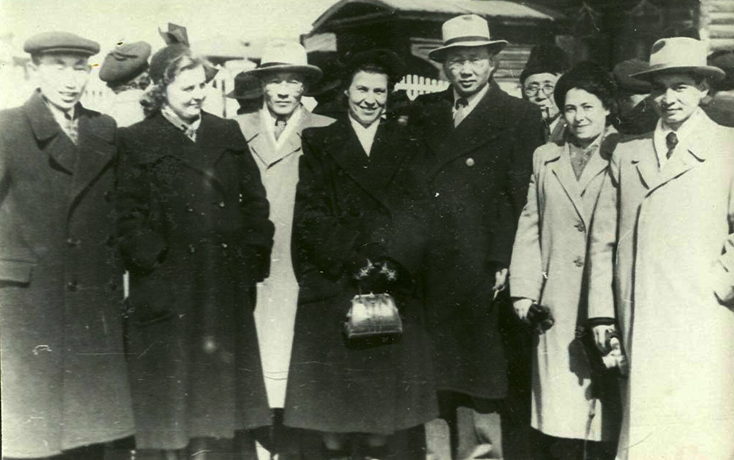
The first prominent scientists, teachers, politicians and statesmen graduated from the Teacher Training Institute. Among them the Member of the Russian Academy of Sciences G.F. Krymsky, the Correspondent Member of the Russian Academy of Sciences N.G. Solomonov, Lenin Prize winners D.D. Krasilnikov and N.N. Efimov, People's Teacher of the USSR M.A. Alekseev, the first Secretary of the Regional Committee of the Communist Party of the Soviet Union G.I. Chiryaev, the Chairman of the Presidium of the Supreme Soviet of YASSR A.Y. Ovchinnikov. In the Institute departments A.E. Mordinov, I.M. Romanov, A.D. Egorov, L.N. Kharitonov and F.G. Safronov prepared their doctoral dissertations. Among the first students, who later defensed their doctoral dissertations and became professors, were A.I. Kuzmin, N.S. Ivanov, G.P. Basharin, N.K. Antonov, G.F. Krymsky, G.L. Elovskaya, N.G. Solomonov, E.I. Korkina, V.F. Afanasiev, D.A. Danilov, V.M. Anisimov, I.S. Portnyagin, D.E. Donskoy, I.E. Tomsky, V.S. Lukovtsev, N.G. Samsonov, P.A. Sleptsov, N.E. Egorov, N.D. Dyachkovsky, N.V. Emelyanov, M.S. Voronkin, G.G. Makarov and others.
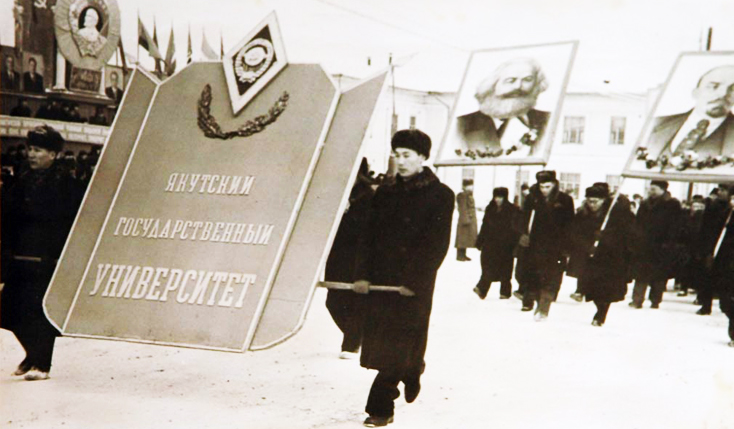
The Yakutsk State University was established by the Ordinance of the Council of Ministers of the USSR on August 23, 1956.
Professor G.P. Basharin explained the important role the Yakut University played in lives of the Yakut people. ‘The University is the most important and the most precious thing that the Yakut people got in the 20th century ... I am happy to say that our university will be a long-lasting torch of civilization and the temple of science in the North-East of the Great Asian Continent. The third millennium generations will understand the importance of our university much deeper than we do. And at the same time, they will be very grateful to us, the generation of the 20th century, for the establishment of the University’, he said.
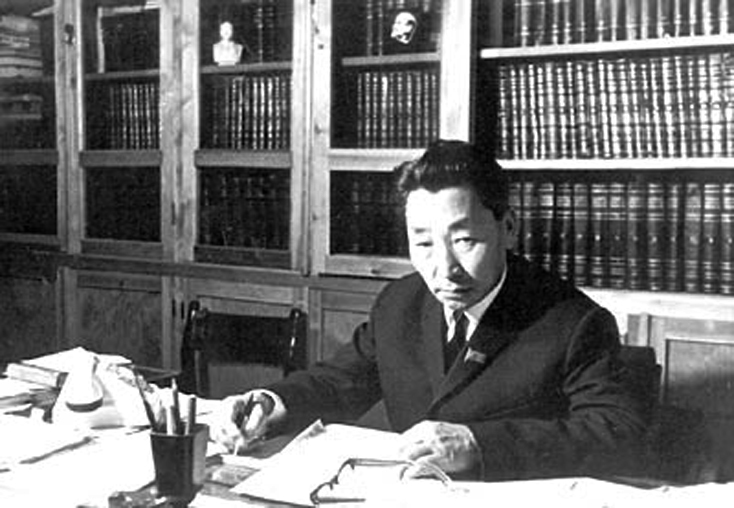
Moscow, Leningrad and Tomsk universities and other higher educational institutions of the Soviet Union and the Russian Federation helped to develop the Yakut State University.
In 1956-1957, 1,200 students studied at the University and 111 lecturers, including 2 Doctors and 34 Doctors of Science worked there.
The Yakutsk State University was awarded the Order of Friendship of Peoples by the Order of the Presidium of the Supreme Soviet of the USSR on April 28, 1984.
In 1990, the University was named after Maksim Kirovich Ammosov, an outstanding statesman, the son of the Yakut people and one of the founders of Yakutia and Kyrgyzstan statehood.
On February 6, 1993, according to the Decree of the President of the Republic of Sakha (Yakutia) M.E. Nikolayev, the Yakut State University was given the status of the Head of the institutions of the Republic, which is responsible for the organization and the quality of humanitarian, social and economic, pedagogical and science training of experts.
Higher Professional Education of the Republic enters a new stage in its development.
In 1991, on the basis of the Informational Computing Centre the Center of New Information Technologies was organized. In 1999, Soros grant was won to create the Internet Technologies Center.
Since 1996, the Yakut State University has been the curator of the scientific and social program “Step into the Future” for young people and pupils. Public Academy “Step into the Future” is organized at the University. Many of the students' research works were awarded medals of the All-Russian open competition for the best student research work and medals of the Russian Academy of Sciences.
In 1997, the scientific and technical program “University Science for Regions” was created by the Ministry of General and Professional Education of the Russian Federation. Under this program, YSU conducts research on the creation and implementation of new technologies in the diamond-processing industry. The Russian Foundation for Basic Research and the Russian Humanitarian Scientific Foundation played an important role in the implementation of scientific research.
On June 16, 1999, the Internet Center was opened in YSU. YSU Internet Center is the 30th of 33 centers that has been opened in the classical universities in Russia in accordance with the program “University Internet Centers”.
The Yakutsk State University firmly stepped into the twenty-first century.
In 2006, YSU had 7 institutes, 9 faculties, 134 departments (99 of which are administering sub-departments) and 2 branches in Neryungri and Mirny. In 2005, there were 13,720 full-time students and 8233 part-time students. In addition, the University had two research institutes, the Republican Interuniversity Research Library, 19 research laboratories, 13 centers, educational support, administrative and economic units and dental clinic.
New results for the main research areas in the field of fundamental and applied sciences were obtained:
- The mathematical and experimental models were created to predict the technical condition of overload mining trucks using the example of ALROSA;
- The problem of selecting the optimal parameters of the thermal regime in the mine workings in permafrost was solved;
- New introduced plant populations were created to restore damaged northern ecosystems;
- The Conception of development of the personnel policy in the priority sectors of the economy of the Republic of Sakha (Yakutia) was made.
The University scientists won 50 grants to conduct the research work according to the federal scientific and technical programs.
The University started intensive development of innovative activity.
As part of the project “Establishment of the Center for Technology Transfer” within the program of the Ministry of Education and Science of the Russian Federation “Development of Scientific Potential of Higher Education Institutions”, YSU Center for Technology Transfer was created. The Centre carried out management of intellectual property and controlled the process of technology transfer, the provision of consulting, scientific and technical and educational services in the area of innovation.
For the first time 4 following projects on creating of small innovative enterprises were supported by the program “Start” held by Bortnik Fund of the Russian Federation: “Development of Fancy Cut Diamonds Using Mathematical Modeling”,
“Creating and Production of Tribological Polymer Composite Products for Extreme Conditions ”, “The Spiral Separator for Removing Small and Fine Particles of Gold from River Sediments” and “Development of Biologically Active Substances Based on Natural Resources of Yakutia to Reduce the Alcohol Products Effects”.
Scientific innovation enterprises engaged in the commercialization of innovations were created. The Yakutsk State University became the regional representative of the Bortnik Fund in the Republic of Sakha (Yakutia).
YSU students took part in All-Russian open competitions of student research works and won medals of the Ministry of Education and Science of the Russian Federation. Postgraduates became the Fellows of the Russian President Vladimir Putin and the Russian Government. Students can study at the University of the Arctic due to mobility program "North to North".
More than 60 University lecturers are members of the Russian Academy of Sciences, civic academies of the Russian Federation and the Academy of Sciences of the Republic of Sakha (Yakutia).
The University had 4doctoral and 4 dissertation councils for the philosophical, pedagogical, biological, physic-mathematical and technical, philological, medical and economic sciences.
The University uses its experience in cooperation with foreign partners in order to train new experts. The University teaching staff takes part in conferences and symposia abroad and goes for professional experience in foreign universities.
The facilities and resources of the University are improving. YSU has branches in Mirny and Neryungri and also 63 academic buildings, 50 of which are located in Yakutsk.
YSU took the 30th position among 92 universities according to the University Ranking 2005.
In 2006, the Yakut State University celebrated the 50th anniversary. On September 1, 2005, the Russian Prime Minister M. Fradkov signed the Decree №1326-p, initiated by the Ministry of Education and Science of the Russian Federation and the President of the Republic of Sakha (Yakutia), about the celebration of the 50th anniversary of the Yakut State University in 2006. As a result, the YSU Development Program 2007-2011 was created. The Government of the Republic of Sakha (Yakutia) and the Russian Federation supported the program with 2 billion 200 million rubles. The construction of dormitories and academic buildings and acquisition of equipment started.
In February 2007, YSU took position among the forty best universities in Russia in the competition for the selection of educational institutions of higher education, introducing innovative educational programs.
In 2007, on the basis of the Center of New Information Technology, the YSU Office of Information and Innovation was established, which started working on the implementation of new innovative technologies in organizational and educational process of the University.
2009
On October 21, 2009, the President of the Russian Federation Dmitry Medvedev signed a decree on creation of Federal Universities in the North-Western, Privolzhsky, Ural and Far-Eastern Federal Districts.
The draft decree was made by the Ministry of Education and Science of the Russian Federation according to the Ordinance of the President of the Russian Federation. On October 14, 2009, at a meeting with Dmitry Medvedev, Andrei Fursenko presented the results of work and proposals for the establishment of new federal universities. The Northern (Arctic) Federal University would be set up on the basis of the Arkhangelsk State Technical University, the Kazan (Volga Region) Federal University on the basis of the Kazan State University named after V.I. Ulyanov-Lenin, the Ural Federal University on the basis of the Ural State Technical University, UPI named after the first President of Russia Boris Yeltsin, the Far Eastern Federal University on the basis of the Far Eastern State University, the North-Eastern Federal University on the basis of the Yakut State University named after M.K. Ammosov.
On November 17, 2009, YSU Academic Council adopted a resolution on the creation of the Federal Autonomous Institution of Higher Professional Education “The North-Eastern Federal University”.
According to the Order from April 2, 2010 № 499-p, the Ministry of Education and Science of the Russian Federation carries out the powers of the founder. All the University property is vested in an autonomous educational institution.
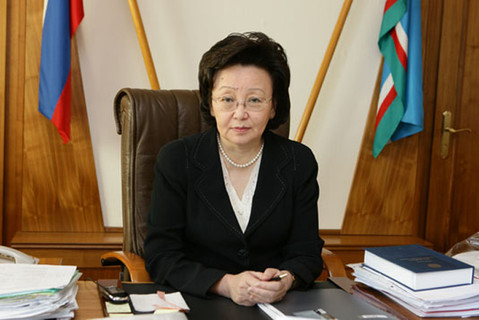
On April 9, 2010, at a meeting on the modernization of higher education that took place in Novosibirsk, the Prime Minister of the Russian Federation Vladimir Putin announced that the Vice-President of Yakutia Evgenia Mikhailova was appointed rector of the North-Eastern Federal University by the Order of the Government of the Russian Federation.
On April 22, 2010, at the VIII Annual National Award “IT Leader” in Moscow, the Yakutsk State University named after M.K. Ammosov won the prize in the category "Educational institutions", which was presented for the first time in 2010.
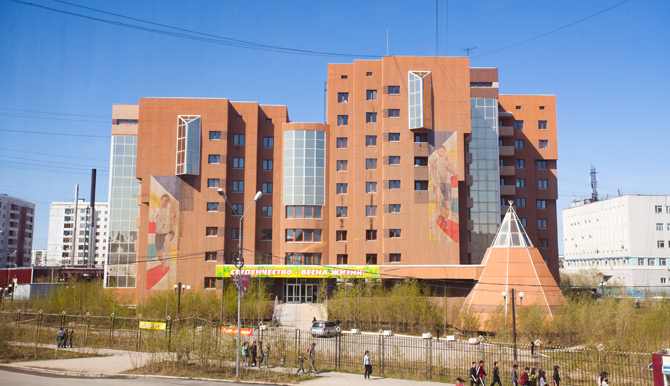
Nowadays NEFU is a multidisciplinary university that provides good opportunities for educational and research work.
Higher Professional Education of the Republic enters a new stage in its development.
The University has 11 institutions, 8 faculties, 141 departments, 3 branches in Neryungri, Mirny and the Chukotka Autonomous Okrug. There are 9 scientific units, including 7 research institutes at the University. Additional education and advanced training are available in two institutes and one center.
The University has a modern material and technical base. There are 40 academic buildings, 69 computer classrooms, library with 6 reading rooms, 10 assembly halls, cultural center “Sergelyakhskie Ogni”, stadium “Yunost”, swimming pool, food production facility and 14 comfortable dormitories.
In 2012, as part of the International Sport Forum “Russia is a Sport Country” and the International Sports Games “Children of Asia”, a sports complex “Triumph” that can seat 3000 was built.
The scientific library has the status of the republic and interuniversity library and the status of the research and methodical center for libraries and academic institutions. Its library stock has 1235006 books.
The University has a lyceum for gifted children, which is the base for future university students.
The main components of the campus are modern and comfortable dormitories. Students live in 14 dormitories with the total living space of 88,340 square meters that equipped according to modern requirements and where 6097 people can stay.
NEFU conducts basic and applied research in the priority areas of the University Development Program:
- Environmental safety and effective reproduction of the mineral resource base and environmental management;
- The use of high technology and production in the North;
- Improving the quality of life in the North;
- The preservation and development of culture of the Arctic people;
- Analytical and personnel support of innovative social and economic development of the North-East of Russia.
Now the University has a rich intellectual potential. 1400 regular lecturers, including more than 176 doctors and 817 candidates of sciences work there.
The University aims to make the graduates a part of scientific, creative and managerial elite our society needs.
NEFU has established longstanding and strong relationships with many foreign universities in the field of education, exchange programs and conferences and symposia are also being held.
NEFU foreign partners are the University of Alaska (Fairbanks, USA), the University of Northern British Columbia and Laval University in Canada, the Technical University of Darmstadt in Germany, Chiba University in Japan and the University from Korea. Centers of Indian and Korean culture were opened at the University with the help of the Embassy of India in Russia.
The University also cooperates with prospective students through small academies and occupational guidance at the stage of pre-university training.
M.K. Ammosov North-Eastern Federal University, which was established on the basis of the Yakut State University, will continue the modernization of higher and postgraduate education that will lead to the strengthening of Russia's positions in the Far East.
The University missions are the training of competitive experts, the research and innovative and technological development for the establishment of an economically sustainable and socially developed circumpolar region, which provides a high quality of life and preservation and development of the culture of the peoples of the North-East of Russia.
Since 2010, there is a constant monitoring of the main indicators of the university's activities. The university trains more than 17 thousand students from 52 subjects of the Russian Federation and 38 countries of the world. NEFU (with branches) implements 458 basic educational programs, including 447 higher education programs and 11 SPE programs. Higher education programs include 191 undergraduate programs, 31 specialist programs, 135 master's programs, 61 postgraduate programs and 29 residency programs.
Preparation of a new generation of professionals begins before the university. In 2010, the University established the Association "North-Eastern University Educational District", which included only 23 educational institutions during the first phase. Currently, the association includes 106 educational institutions of 5 subjects of the Far Eastern Federal District - the Republic of Sakha (Yakutia), the Chukotka Autonomous Okrug, Magadan and Sakhalin regions, and the Kamchatka Territory. Among the participants of the association - 91 schools (84 - RS (Y), 5 - Magadan region, 1 - Kamchatka Territory, 1 - Sakhalin region), 7 institutions of additional education, 7 institutions of SPE. About 40 thousand children study at the Association's schools, almost 4 thousand teachers work.

The work of the university with schoolchildren covers primary, basic and secondary general education. For junior schoolchildren, in 2013, the Primary School Laboratory of the Pedagogical and Medical Institute was established, the University Lyceum was established in 2016 (specialized educational and scientific center (SEAC)), the University created 8 university classes in 5 schools (Schools № 5, №2, №31, Verkhnevilyuisk School named after I. Barakhov). There are preparatory and development courses for schoolchildren, the "Virtual Lyceum" is working for pupils of schools located in remote settlements, 4 small academies (medical, linguistic, computer, engineering), the Winter School of Olympiads, the Professorial School.
A priority task for the university staff is to increase the volumes and further diversify the sources of funding, interact with partner organizations and actively participate in grants competitions for research funding.
The volume of funds drawn from participation in government research funds competitions increased by 5.3 times compared to 2013 and was RUR 28.5 million in 2017.
NEFU has 267 objects of intellectual property. There are 25 small innovative businesses (SIB) at the university. For 7 years, 10 centers have been established at NEFU, carrying out expert activities, greatly enhancing the expertise of the university and the region as a whole.
NEFU is one of the first universities in the country in which an endowment fund was established – university endowment. The fund has financed university projects aimed at developing the campus, scientific research, academic mobility of students and employees, social support of students and development of human resources.
NEFU students achieve success in almost all areas - in technical, humanitarian, social, exact sciences, in sports competitions and creative competitions. First of all, the victory gives them confidence in their abilities, an incentive for further development and work on themselves.
In 2017, NEFU for the first time entered the world subject ranking of the agency Round University Ranking. According to the results of the ranking, NEFU took the fifth place in Russia and 269 worldwide in the humanities, in natural sciences - 18 in the country and 495 among foreign universities, in public - fourth place in Russia and 317 in the world, the university took 26 place in technical sciences in Russia and 487 in the world.
NEFU has strengthened its position in the international rankings of QS universities. The University was included for the first time in the university ranking of the countries of the Developing Europe and Central Asia and took 151-200 place, and, consolidating the success of the last year, entered the top 200 best universities in the BRICS countries, taking 151-200 place.
In the ranking of the European Scientific and Industrial Chamber of Higher Educational Institutions, Academic Ranking of World Universities-European Standard ARES-2017, NEFU took the 57th place among the Russian universities (in total, 100 Russian universities were ranked), having received the BBB rating as an institution of higher education that is characterized by reliable quality of teaching, scientific activity and the demand for graduates by employers.
According to the results of the international ranking of universities, Round University Ranking (RUR), in which 763 universities from 72 countries took part, NEFU took the 544th place in the world and 16th place among Russian universities. The University entered the Golden League of the best universities in the world (TOP-200) in the "Level of Teaching" parameter, ranking 185 worldwide and 12 nationwide.
In 2018, NEFU took the 28th place in the ranking of Webometrics among Russian universities. A total of about 12,000 universities from more than 200 countries are included in the ranking.
The new university will be a major scientific and educational center of the entire North-East of Russia and will seek the Russian and international recognition.